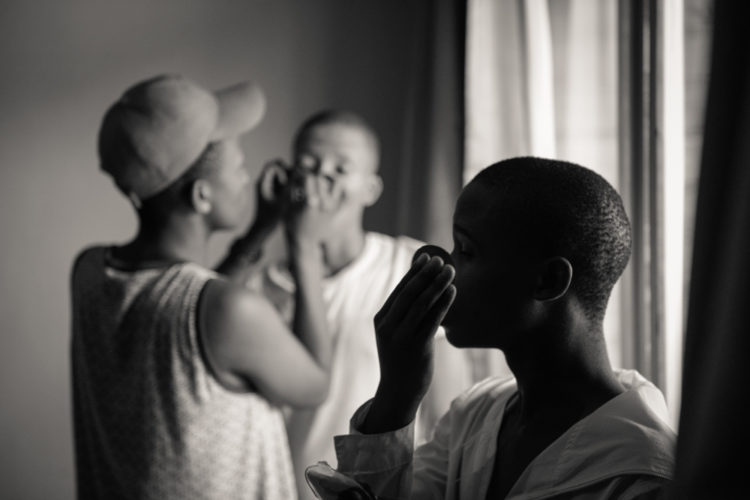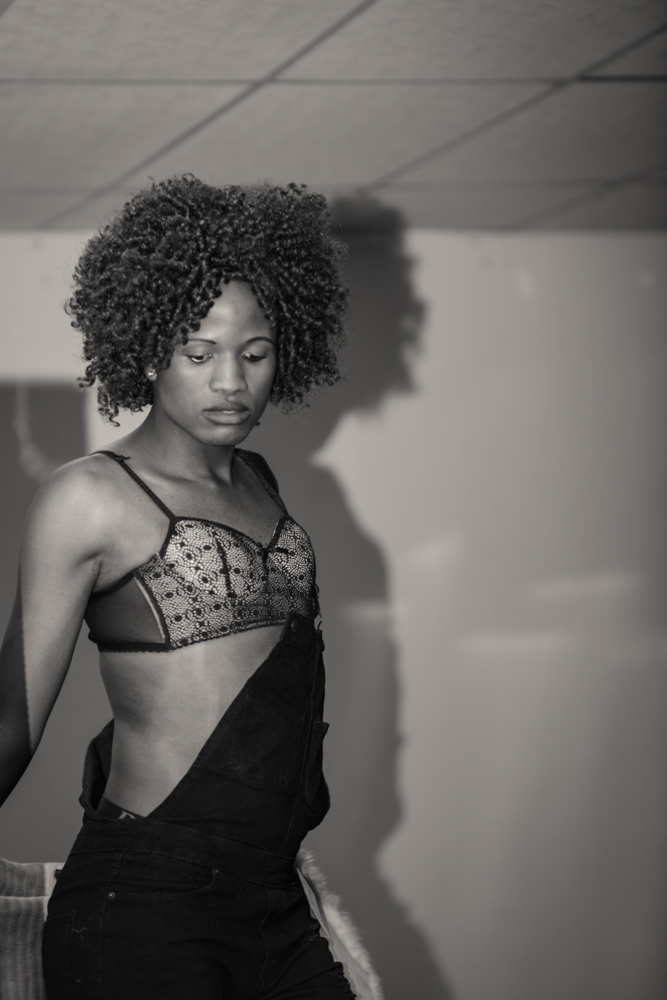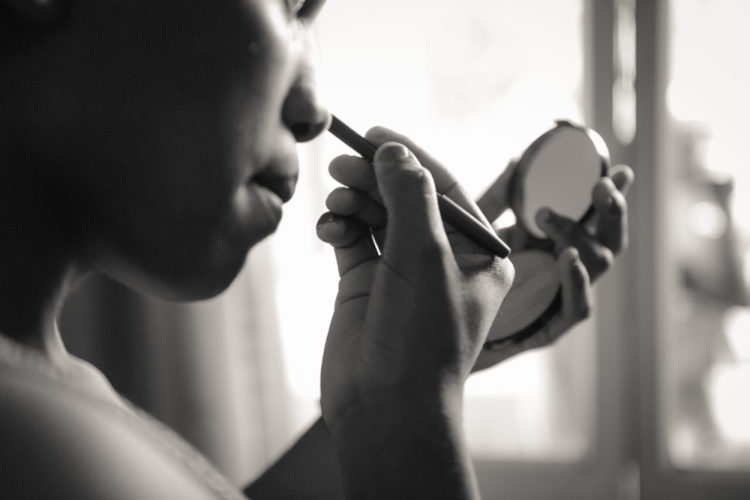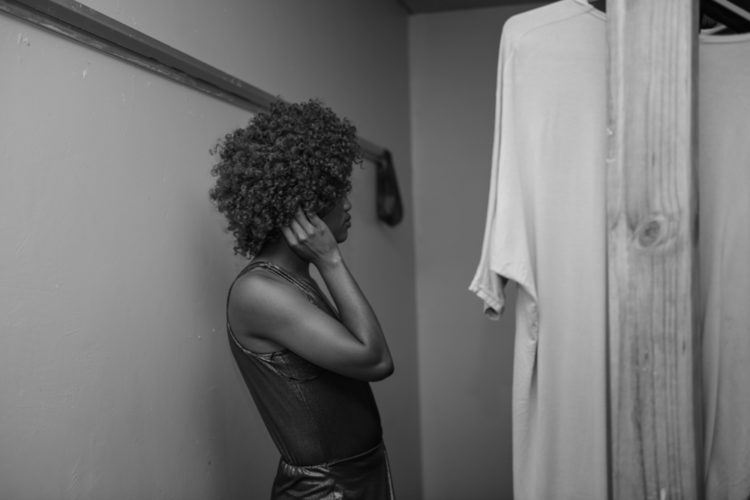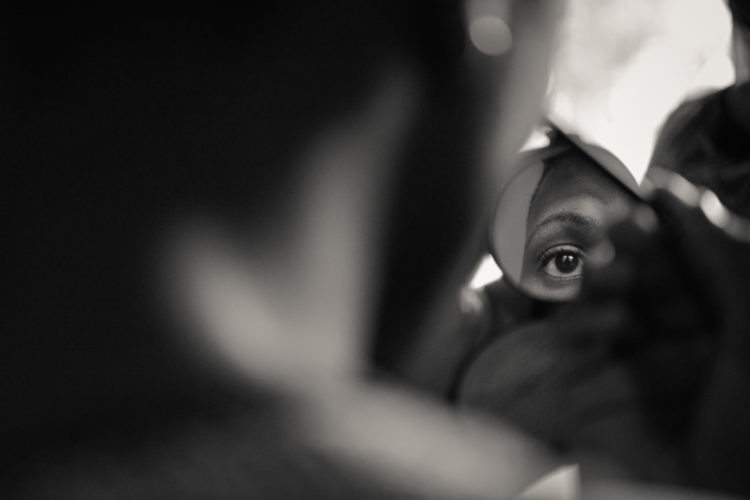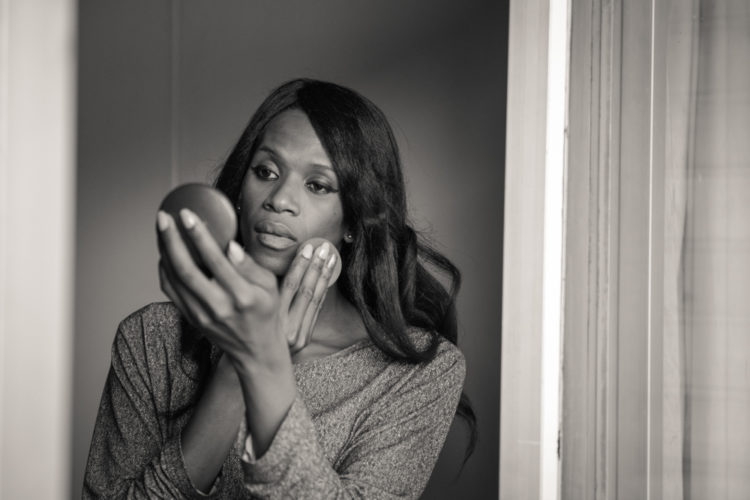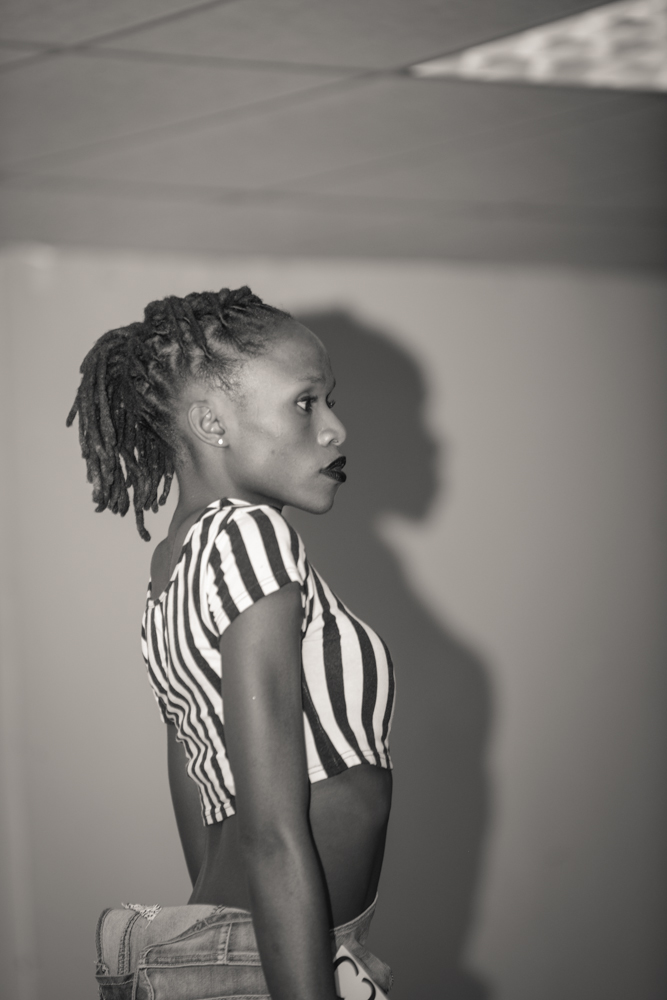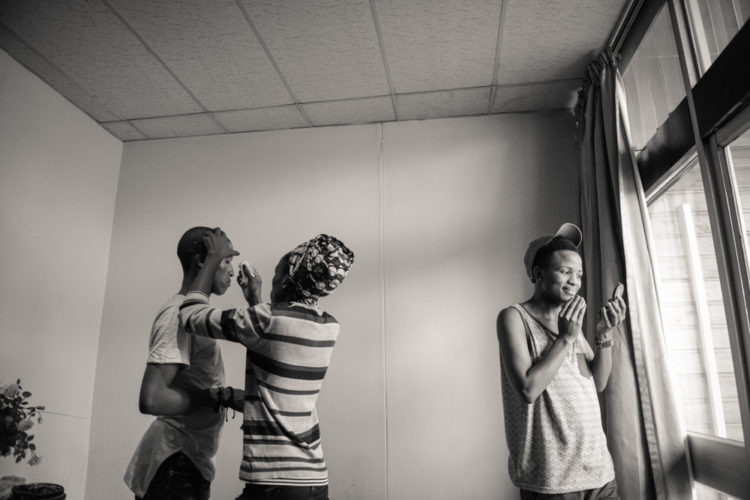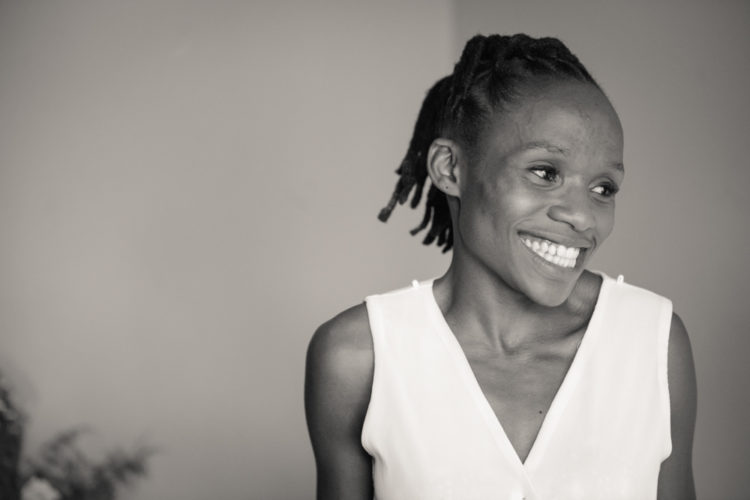Changes Maoeng is standing in the middle of the room with an eyeliner pencil in his hand and a hesitant expression on his face. He is wearing shorts, a sleeveless T-shirt and a baseball cap. There is a buzz of activity and chatter around him. I catch snippets of the many conversations that are taking place all at once: ‘Guys! Who is going to do my makeup? …Where’s the eyeshadow? … Look in that bag over there… Have you steamed your outfits? … I’ll be wearing a blonde wig… Who took my mirror?’
We are in a small room in the Victoria Hotel in Maseru, Lesotho. Bags and clothes are strewn across the floor. Stiletto heels of varying colours have been lined up next to the many outfits hanging from a clothing rack set against a wall. The men and trans-women in the room are getting ready. They stand alone or in pairs, combing out their wigs, admiring their reflections in compact mirrors or helping one another apply foundation.
21-year-old Maoeng (below) is one of the nine contestants who will be competing in tonight’s Miss Gay Lesotho – a beauty pageant in drag. The event is organised by The People’s Matrix Association, who since 2008 have led the country’s emerging LGBTI-rights movement.
As is the case with many former British colonies and protectorates, Lesotho continues to prohibit male same-sex sodomy as a common law offence. The law is ‘silent’ – in the sense that it has never been enforced in an instance of consensual sexual activity. Nonetheless, it remains in place, as do widespread attitudes of homophobia and conservatism.
Instances of violent homophobic attacks in Lesotho are rare, but traditional gender roles continue to be firmly entrenched, and there is little understanding or tolerance towards those who deviate from the ‘norm’. The country is predominantly Christian, and religious viewpoints often underpin intolerant and discriminatory attitudes.
Over the past eight years, The People’s Matrix have worked tirelessly to begin to change these attitudes by engaging communities and cultural and spiritual leaders in a wide variety of programs and activities, including dialogues, film screenings and media awareness campaigns. The organisation also holds an annual public march through Maseru in commemoration of the International Day Against Homophobia, Transphobia and Biphobia (IDAHOT). In June 2016, Lesotho’s Deputy Prime Minister Mothetjoa Metsing publicly announced that the government was considering decriminalising same-sex relationships.
I made it to the top five in 2014, but tonight I feel like I’m already the queen!
I ask Maoeng what outfit he has planned and he throws me a puzzled look in response. ‘I have at least seven!’ He laughs. He has a wide smile, a gentle voice and beautifully expressive eyes. This is not his first time as a contestant in Miss Gay – he also entered the pageant in its inaugural year in 2014. ‘I was a little bit shy back then,’ he admits. ‘My confidence has grown over the past few years. I made it to the top five in 2014, but tonight I feel like I’m already the queen!’ He looks around the room and then adds jokingly, ‘I don’t see any competition here! I’m so confident! That’s not a bad thing, right?’
Currently in his third-year at university, Maoeng says that he is lucky to have a family who understands and accepts his sexuality. ‘I don’t think I’ve ever been in the closet with my family – it’s always been obvious to them that I’m gay, there’s been no need to hide it. They know that I’m taking part in this contest tonight, and they’re happy and proud. They’re hoping that I’ll win. They know that their kid is cute!’
‘Some families in Lesotho don’t accept their gay and lesbian children,’ he continues. ‘They chase them away. They tell them: “If you’re like this, you’re not going to be my kid.” I’m lucky because I haven’t had any bad experiences of homophobia. I usually wear guy’s clothing, because that’s what I’m comfortable in. But I love putting on make up and wearing a dress and heels. It makes me feel good, as if I’m somebody else.’
I ask Maoeng what would happen if he and other men were to walk around the streets of Maseru in drag. He looks at me for a moment and then says, ‘There would be homophobic name-callings. And violence. I think people would do something bad to us.’
We cut the interview short because Maoeng needs to start getting ready. I watch as the men and trans-women around me undergo a slow transformation. Their features are heightened by lipstick and eye shadow, their faces seem softer when framed by long hair, and everyone in stilettos is suddenly taller, straight-backed and graceful. I glance at Maoeng, who is wearing a wig of thick curls, a glittering short dress and golden stilettos. The show is about to begin.
True to Maoeng’s word, there are no less than eight outfit changes over the course of the night. The contestants parade confidently across the stage, their expressions straight-faced and serious. There is an audience of about 150 people in the room, and their enthusiasm grows as the night progresses. Loud cheers and applause rise over the thumping music, and many people remain on their feet, holding up their phones to photograph and film the event.
After the first few rounds, the judges narrow the nine contestants down to seven, and then to five, and finally to the top three. I watch in amazement as Maoeng’s predictions come true and he is crowned Miss Gay 2016. He stands in front of the audience and beams, wearing a silver tiara, a long black dress and a white sash that proclaims his new title.
At the end of the night, I have a conversation with Leshoboro Mokhameleli, one of the organisers of the event and a key member of The People’s Matrix Association. ‘We aim to use Miss Gay as a platform for people to interact with the LGBTI community,’ he tells me. ‘We had a really diverse audience here tonight – a lot of straight people came to show their support. We’re definitely making progress: when this event first started it was something small and hidden, a night that was only for the gay community. This year it was all over social networks, and we even had the media covering it.’
‘This is the only event where we can celebrate ourselves without any worries – where people can dress how they want and express themselves in any way they like. We want the event to grow – next year we’re hoping to double the audience size to 300 or 400 people.’
I call Maoeng the next day to congratulate him and to ask him about his experience of the night. ‘It was such an amazing feeling to be crowned the queen!’ he gushes. ‘I was so grateful. People have been showing me so much love – my classmates were ululating for me today, and they even brought me a cake. Even the guys who I thought would be homophobic have shown me so much support.’
‘At first, I was afraid of having my name and face in the media, of being exposed like that, but then a friend of mine said to me: this could be a great opportunity for you. What’s with the hiding and the anonymity? I realised that she was right, and since then I’ve felt more open about sharing the experience. The event has made me feel more confident, more brave.’
Contact The People’s Matrix Association

